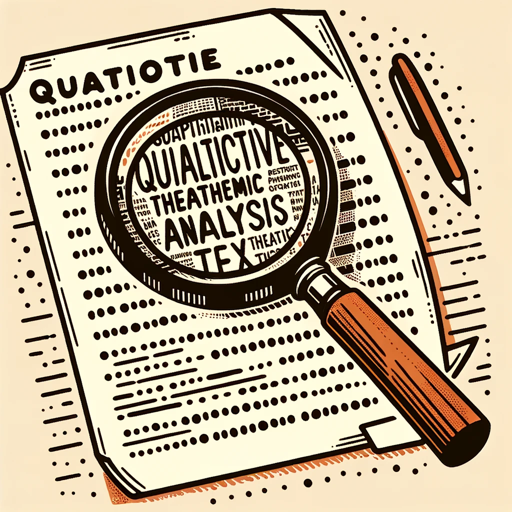Grounded Theory Analyzer-qualitative research data analysis
AI-Powered Qualitative Research Tool
Can you develop initial codes from this data?
Please provide quotes supporting the initial codes.
How do the focused codes relate to the data?
Can you explore connections between focused codes?
Create a theory based on the data analysis.
Related Tools
Load More
Qualitative Research Data Analysis
Expert in thematic analysis, identifies themes in transcripts, provides detailed theme info.

Thematic Analysis by Dr Kriukow
All-in-one tool for qualitative research and qualitative data analysis - support with thematic analysis, NVivo software, qualitative coding, research planning and implementation

ATLAS.ti Research Assistant
Your dutiful assistant, ready to help you with any part of your research process. Ask questions, upload your literature or data, and creatively harness AI.

Qualitative Researcher
Expert in qualitative research and document analysis.

NVivo Data Analysis
The "Nvivo Data Analysis Expert" model is a highly specialized AI tool designed to offer comprehensive guidance for users working with NVivo, a leading qualitative data analysis software. It guides users to code, theme, and interpret complex qualitative d
扎根理论分析
学君设计,用于扎根理论编码分析,微信:15600573910
20.0 / 5 (200 votes)
Introduction to Grounded Theory Analyzer
Grounded Theory Analyzer (GTA) is a specialized tool designed to facilitate qualitative research through grounded theory methodology. Its core purpose is to assist researchers in systematically analyzing data, developing initial codes, refining them into focused codes, and ultimately constructing theories that are deeply rooted in the data. GTA emphasizes an iterative, repetitive process that requires constant engagement with the data, allowing researchers to explore and identify underlying patterns, relationships, and themes. For example, a researcher examining the impact of leadership styles on team morale could use GTA to uncover nuanced insights by continuously refining codes and comparing them across multiple data sets. This tool is particularly valuable in fields where understanding complex social phenomena, such as mental health stigma or workplace discrimination, is crucial.

Main Functions of Grounded Theory Analyzer
Initial Coding
Example
A researcher studying the experiences of homeless individuals might use GTA to label key segments of interview transcripts with initial codes like 'seeking shelter,' 'feeling isolated,' and 'community support.'
Scenario
In a real-world scenario, this function helps in breaking down raw data into manageable segments, making it easier to identify significant themes early in the research process.
Focused Coding
Example
After generating a list of initial codes, the researcher refines them by identifying dominant themes such as 'coping mechanisms' and 'systemic barriers,' grouping related codes under these categories.
Scenario
This function is applied when a researcher needs to narrow down and organize data, ensuring that the most relevant and significant patterns are emphasized, thereby simplifying the complexity of large data sets.
Theoretical Coding
Example
The researcher connects the focused codes to develop a theory that explains how systemic barriers perpetuate homelessness, integrating categories like 'economic factors' and 'social stigma.'
Scenario
Theoretical coding is used in the final stages of analysis, where the goal is to form a coherent theoretical framework that can explain the relationships and dynamics observed in the data.
Ideal Users of Grounded Theory Analyzer
Academic Researchers
Academic researchers, particularly in the social sciences, are the primary users of GTA. They benefit from its ability to help develop theories from qualitative data, especially in exploratory studies where the goal is to uncover new insights into human behavior, social processes, or institutional dynamics.
Graduate Students
Graduate students conducting thesis or dissertation research can use GTA to systematically analyze qualitative data, ensuring that their findings are grounded in the data. The tool is especially useful for those new to grounded theory, as it provides a structured approach to data analysis.

How to Use Grounded Theory Analyzer
1. Visit the Website
Visit aichatonline.org for a free trial without login, also no need for ChatGPT Plus. Ensure you have a stable internet connection for the best experience.
2. Upload Your Data
Gather your qualitative data (e.g., transcripts, interview notes) and upload them into the Grounded Theory Analyzer. Ensure your data is in a compatible format like .docx or .pdf.
3. Initial Coding
Start by conducting initial coding of your data. The analyzer will assist in breaking down the data into significant parts, assigning codes to relevant sections.
4. Focused Coding
Refine your codes by identifying dominant themes. The analyzer will help in grouping similar codes and identifying patterns to form categories.
5. Theoretical Coding
Integrate categories to develop a theory. Use the analyzer’s tools to connect categories, forming an abstract explanation of the studied phenomenon.
Try other advanced and practical GPTs
Grasshopper Tutor
AI-driven algorithmic modeling support.

Master Art
AI-Powered Tool for Artistic Creations

Genetics Genie
AI-Powered Genetics Insights
Learn Chinese Character
AI-powered Chinese character mastery.

AutonomousStoryWeaver
AI-Powered Story Crafting Made Easy

Case Study Analyst
AI-Powered Insights for Case Studies
AdamsArt Image Analyzer
AI-powered image analysis for deeper artistic insights.

AMBOSS Medical Knowledge
AI-powered medical insights instantly.

Master Black Belt Lean Advisor
AI-powered Lean Six Sigma optimization.

Power Apps Developer
AI-powered custom app creation

Bible Tutor
AI-powered Bible insights for everyone

MBA Operations Management Specialist
AI-powered operations management for optimal efficiency.

- Research Analysis
- Content Review
- Data Coding
- Theory Development
- Qualitative Studies
Grounded Theory Analyzer FAQs
What types of data can I analyze using Grounded Theory Analyzer?
You can analyze a wide range of qualitative data including interview transcripts, focus group discussions, observational notes, and documents. The tool supports formats like .docx, .pdf, and .txt.
How does Grounded Theory Analyzer assist in the coding process?
The analyzer simplifies the coding process by guiding you through initial coding, focused coding, and theoretical coding. It helps identify significant segments of your data, groups related codes, and supports the development of a coherent theory.
Can I use the Grounded Theory Analyzer for non-academic purposes?
Yes, the Grounded Theory Analyzer is versatile and can be used for various purposes beyond academia, including business research, policy analysis, and organizational studies.
How does Grounded Theory Analyzer ensure the credibility of the theory developed?
The analyzer emphasizes constant comparison and theoretical sampling, ensuring that the emerging theory is well-grounded in data and can be tested against new data to achieve saturation.
What are the prerequisites for using Grounded Theory Analyzer?
Before using the tool, ensure that you have your qualitative data ready for analysis. Familiarity with basic qualitative research concepts like coding and thematic analysis will also enhance your experience.